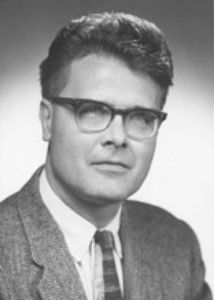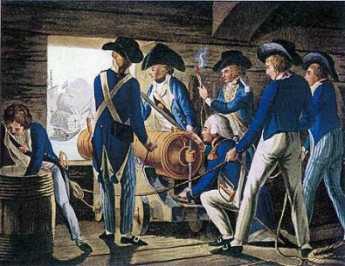Related Topics
Robert Morris: The Dark Side
The richest man in America suddenly was locked in debtor's prison, $12 million in debt. While in prison, he reduced that to $3 million, and got released under a new bankruptcy law he helped devise.
How Could an Honest Man Go Bankrupt?

|
| E. James Ferguson |
James Ferguson was a Twentieth-century historian who spent most of his life compiling and editing the papers of Robert Morris covering the four years (1781-1784) he was in charge of American finances. Although Ferguson was strictly impartial or even somewhat censorious, he made the statement that he had never discovered any instance of Robert Morris engaging in self-dealing or dishonesty in handling government affairs. Likewise, Arthur Lee, who certainly qualifies as Morris's worst enemy, was in charge of a Congressional investigation of the accusations of Morris as corrupt which finally led to the conclusion that no dishonesty had been found. If any corruption is found in the future, it must thus be found in some remote corner of a mountain of careful bookkeeping by a man who was mostly too rich to bother with the immense task of covering his tracks with double books. And Morris really was very rich. One contemporary scholar, a historian for the Independence Hall Park Service, estimates that until things began to crumble, Morris was as rich in present value as Bill Gates. A quick check of that assertion would start with his unpaid debts of $12 million at the time he went to debtors prison, and then adjustment for intervening inflation. The snarling assumption that no man could get to be that rich -- honestly -- is the as yet unsupported belief underlying any smug satisfaction, then and now, with his legal downfall.

|
| British Navy |
This amounts to astonishing denial. Although many billions of dollars have been amassed by many contemporary financiers of only single facets of investment banking, persisting suspicion implies it was justified to imprison a man who invented maritime insurance, central banking, commercial credit, the substitution of credit for paper currency, the organization of a privateer navy which fought the British Navy to a standstill, financed the Revolutionary War and the importation of almost all its munitions in spite of the sinking of 150 of his own ships. Morris effectively ran the Revolutionary government while he did these things-- not only an astonishing series of accomplishments in four years but seemingly quite enough achievement to attain wealth. Instead, one hears especially in Virginia, the implacable conviction that no one could possibly do all that, honestly.
Or alternatively, the thesis might be advanced that only passionate idealism would drive a man of such talents to such exertions, gently alluding to his seemingly disgraceful refusal to sign Jefferson's Declaration of Independence at the vital moment, which is accepted as sure proof of duplicity. Somehow this offense cannot be expunged by his rescuing the finances of the War when the whole Continental Congress was lost in the blind alley of inflation and price controls, on the edge of letting Washington lose the battle of Trenton for lack of gunpowder. Or largely by his own efforts getting the Articles of Confederation ratified after five years. Or, discovering their vital weaknesses, setting about to rectify them in a new constitution, and driving it through the ratification by Pennsylvania. The system of checks and balances then mysteriously emerged, without clear identification of whose idea it was. It certainly sounds like Hume and Adam Smith. They weren't present at the Constitutional Convention. But Morris was, with a lifetime of matching willing buyers with willing sellers, in mutually advantageous binding agreements.
Originally published: Tuesday, May 17, 2011; most-recently modified: Tuesday, May 21, 2019